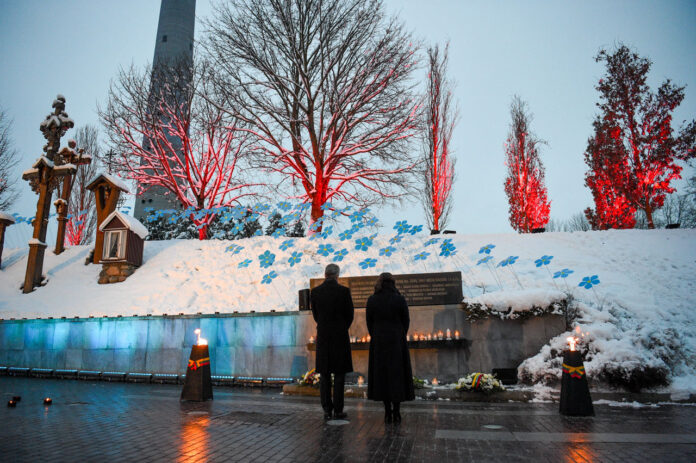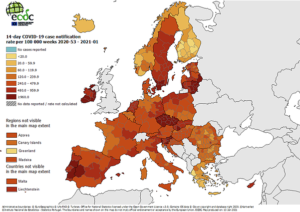
COVID-19 Update
LRT.lt reports that Lithuania has recorded the highest number of deaths per 1 million people in the European Union, according to figures published by the European Centre for Disease Prevention and Control (ECDC) on January 14. Over the past 14 days, Lithuania’s death rate from Covid-19 stood at 344 per 1 million people. In Europe as a whole, only Liechtenstein has recorded a higher number with 573 deaths per 1 million people.
Meanwhile, Lithuania’s number of coronavirus infections per 100,000 people has dropped to 1,004, still the fourth highest in the EU and eighth highest number in Europe. On January 15, Lithuania registered 1,149 new Covid-19 cases. The country’s death toll has now risen to 2,376.
Overall, 165,560 people have tested positive for Covid-19 in Lithuania since the pandemic started. About 61,574 people are still ill with the virus, while 100,495 have recovered.
As of Friday morning, 38,026 people in Lithuania have received their first coronavirus vaccine shots. A total of 1,788,755 tests for Covid-19 have been carried out in the country so far.

Lithuania’s Key Role in 1991
On the 30th anniversary of the Soviet crackdown on unarmed civilians in Vilnius on January 13, 1991, European Commission President Ursula von der Leyen said “Our Union owes Lithuania’s freedom defenders because today’s Europe would look different without their bravery”, and “The events of January 1991 played a decisive role in overcoming the division of our continent…
At the time, resistance against the Soviet Union almost seemed like as a hopeless gesture. But what happened that night in Vilnius reverberated all over the world. The events caused shockwaves that in the end shattered the Soviet empire.”
She added that today, as a proud member of the European Union, Lithuania is at the heart of European cooperation. She noted that from 2004 until now, living standards have risen dramatically, and “Lithuanians are optimistic about the future of the European Union,” she said. “For me, this is the best way to hold up the freedom defenders’ legacy: be a proud and vital part of a Union that defends the values that were so dear to their hearts.”
Lithuania has designated January 13 the Day of Freedom Defenders to honor the victims of the Soviet aggression. This year, the anniversary was marked mostly with virtual events due to the coronavirus lockdown restrictions. Many of the events traditionally held on the eve of January 13 – the lighting of bonfires, a concert and a run through the streets of Vilnius – have been moved to August. The commemorations began on Wednesday morning with the lighting of candles in windows across the country.
The traditional commemoration of the January 13 events in parliament (Seimas) moved online. A video recording of the celebration of the Day of the Defenders of Freedom and the Freedom Prize award ceremony were being streamed on the Internet and broadcast by LRT Television and Radio. Seimas awarded this year’s Freedom Prize to Belarus’ democratic opposition. It was presented to Belarusian opposition leader Svetlana Tikhanovskaya who currently lives in Vilnius.
Lithuanian and Polish Parliamentary Committees
On January 13, the Committee on Foreign Affairs of the Seimas of Lithuania held a meeting with their colleagues from the Foreign Affairs Committee of the Sejm of Poland. The Polish MP’s emphasized that January 13 was a significant day for Lithuania and for the entire Central European region as it had laid the foundations for the liberation of other countries from the totalitarian regime.
MP’s from the two countries agreed to pursue closer cooperation in addressing challenges in the region and across the world, and that it is important for both countries relate to free and democratic elections in Belarus. The MPs will cooperate “in assessing the decade’s achievements and mistakes of the European Union’s Eastern Partnership” so as to set up a framework for a “revised Eastern Partnership policy”.
The two committees will adopt a declaration on February 4 to mark the 275th birth anniversary of Tadas Kosciuska, known as Tadeusz Kosciuszko in Poland. The MPs invited representatives of Foreign Affairs Committee of the US Congress and the Belarusian opposition to join the declaration.
Foreign Affairs Priorities
called At a meeting of the Foreign Policy Coordination to discuss priorities and goals for 2021, president Gitanas Nausėda noted that foreign policy remains focused on NATO-oriented national security, active participation in the European Union Eastern partnership initiative, and blocking the threat of the Astravas nuclear plant at the EU level.
First on the agenda was analysis of the situation in and determination of long-term policy regarding Belarus. A strategy will be formulated to include political, economic, security, cultural and historical factors. Considering the national security, health and environmental danger that the Astravas plant presents, its containment is one of the highest goals of Lithuania’s foreign and energy policy. All diplomatic means will be used to ensure that the decisions of the European Leadership Council will be implemented so that energy from unsafe third-party sources does not reach the European Union market.
Also discussed were issues of national security, NATO agendas and coordinated preparation for the NATO summit meeting. As to EU scheduling, the focus was on controlling the COVID virus and ensuring transparency in the distribution of vaccines in EU countries. Efforts will also be made to help implement vaccination in the Eastern partnership countries.
Other topics included multi-year ES funding plans, with top priorities being Lithuania’s economic competitiveness and climate change mitigation.
With news from LRT.lt, Lithuania Dailly News Bulletin, alkas.lt
































